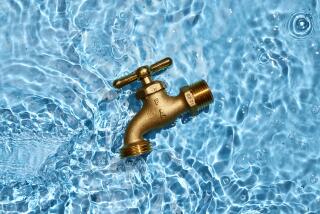New Worry for Pregnant Women
- Share via
In the waiting room of the UCLA obstetrics and gynecology center, Melissa Jurist, 10 weeks’ pregnant with her second child, fiddled nervously with a tissue Tuesday and wondered how best to make drinking water safe for her unborn baby.
Though some officials advise that boiling might be the best method, Jurist was weighing a switch from tap to bottled water--and wondering if she could afford it.
Jurist and many other expectant parents were doing their nervous best Tuesday to assess the latest warning for pregnant women: Five or more glasses of cold tap water can increase the first-trimester risk of miscarriage because of the presence of the chemical byproducts called trihalomethanes, according to a new state study.
A 33-year-old stay-at-home mother, Jurist is married to a Caltech graduate student. Their first child, Imogen, is still in diapers and the family lives off of a yearly $15,000 stipend.
“Buying bottled water is an extra $10 a week--that’s half a pack of diapers,” said Jurist, who said she had been drinking two liters of tap water a day. “We’re very worried about it.”
The worriers on Tuesday were the already-very-careful women who have been drinking decaffeinated coffee for years (just in case they got pregnant), eschew artificial sweeteners, wouldn’t dream of imbibing and view lit cigarettes as swords in the hearts of their unborn children.
But even as these women worried, medical professionals counseled caution and some expectant parents, tired of keeping up with the scare of the day, threw their hands up in despair of ever being able to follow doctors’ orders.
Many said they had already put tap water on their list of no-nos--even as city officials on Tuesday reacted to the new study by pointedly noting that bottled water is not regulated.
“I always go with bottled water, even before the pregnancy,” said five-months-along Maxine Hallet, sipping on a half-liter of the clear liquid as she waited to see her obstetrician at UCLA.
Dr. Lyn Yasumura, a Pasadena obstetrician / gynecologist who is herself five months’ pregnant, said she had a couple of patients ask her thoughts on the matter Tuesday. Those who had not read the latest warning heard a cautious one from Yasumura, who uses a carbon-filter pitcher at home.
“I think that if they are raising a potential risk and there is something simple to do--buying a filter is not terribly expensive--it’s an easy thing to advise,” Yasumura said, noting that she has not read the study and found reported results inconclusive. “If it’s going to help, great. If it isn’t, you haven’t hurt yourself.”
Some medical professionals said they were wary of panicking their patients.
Dr. Karen Filkins, director of reproductive genetics at UCLA Medical Center’s department of obstetrics and gynecology, said she hesitates to recommend boiling, which can concentrate certain contaminates unless the boiling is limited to one minute, as city officials recommended Tuesday. The best bet, she said, might be simply drinking fewer than five glasses of tap water a day.
Filkins, an expert in prenatal exposure, stressed that on the long list of environmental toxins harmful to unborn babies, tap water would be near the bottom.
“I’m not overly concerned--one study does not prove anything,” Filkins said.
Murielle Mull, 31 and pregnant with her first child, said she can hardly keep the dietary restrictions straight--but that hasn’t stopped her from trying to follow them.
She has already given up soda, tea and coffee. “It’s really kind of scary,” Mull said. “I just wonder what we should do. What should we drink?”
Jurist said that during her checkup on Tuesday, she heard her infant’s heartbeat for the first time. That renewed her resolve to protect the fetus. “Any risk is too much risk for me,” she said.
*
Times staff writer Karima A. Haynes contributed to this story.






